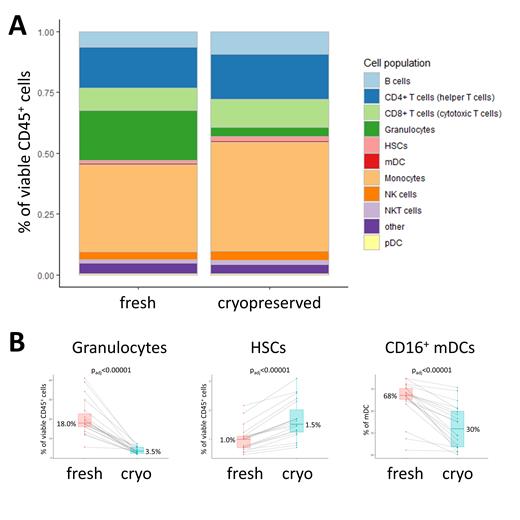The impact of the cellular composition of PBSC grafts on the immune reconstitution as well as graft-versus-host and graft-versus-leukemia effects after allogeneic hematopoietic cell transplantation (alloHCT) is only poorly understood. DKMS and NMDP joined forces to comprehensively characterize the cellular composition of 2,000 PBSC products using a 34-color flow cytometry panel to define immune effector cell subsets of interest and hematopoietic stem cells. In parallel, we have created a biobank of unstimulated donor PBMC and PBSC graft samples for future analyses. As part of this larger effort, we investigated the effect of cryopreservation on the cellular composition of PBSC products. Cryopreservation of PBSC grafts was used frequently during the COVID19-pandemic and facilitated more flexible timelines for transplantation. Still, one third of the US patients and 15% of the German patients continue to receive cryopreserved PBSC grafts. Ongoing studies are investigating the impact of cryopreservation on immune-effector cell function and the outcome of hematopoietic stem cell transplantation. Several observational studies have reported delayed neutrophil and platelet engraftment with cryopreserved products. More recently, less chronic GVHD was reported for patients who had received cryopreserved PBSC products. Cryopreservation affects the cellular composition and hence has the potential to change immune effector cell functions of the graft, but available data on the alterations of cell population frequencies are scarce. We analyzed the cellular composition of 20 fresh grafts and compared them to their frozen and thawed counterparts. Cryopreservation of product samples followed routine clinical procedures using a 10% DMSO containing cryo-medium and a controlled rate freezing. After thawing at 37°C, cells were washed, stained with a 34-parameter phenotyping panel, fixed and analyzed immediately on a full spectrum flow cytometer. Following spectral unmixing and manual spillover correction, proportions of immune cells were assessed using manual gating. First, we investigated the relative frequencies of 10 non-overlapping individual cell populations relative to viable CD45+ cells, including several lymphocyte populations, monocytes, granulocytes, hematopoietic stem cells (HSC) and dendritic cells. Granulocytes showed the largest decrease after cryopreservation and thawing (18.2 % vs 3.5 %; p<0.001). The loss of granulocytes results in an increase of relative frequencies of many other immune cell populations including monocytes (35.4 % vs 44.7 %; p=0.018), B cells (5.8 % vs 9.6 %; p=0.006), and HSC (1.0 % vs 1.5 %; p<0.001). We therefore also calculated changes relative to the viable non-granulocyte cells. By doing so, a significant relative increase of cells was observed for HSC (1.2 % vs 1.6 %; p<0.001), whereas monocyte and B cell frequencies changed only marginally. This suggests that HSC are more resilient to freezing than other cell types. When comparing the proportions of 40 other immune cell (sub-) populations relative to their parent population in the gating hierarchy, we found a profound and significant decrease of the relative frequencies for CD16+ myeloid dendritic cells (mDCs, 68 % vs 30 % of all mDCs; p<0.001) and granulocytic myeloid derived suppressor cells (gMDSCs, 2 % vs 1 % of all MDSCs; p<0.001). In an independent set of analyses performed at Roswell Park Comprehensive Cancer Center, Buffalo, comparable results were obtained with a significant increase of HSC, a significant decrease of CD16+ mDCs, and a trend of a decrease of gMDSCs. As CD16+ mDCs may have a role in the development of chronic GVHD after alloHCT, this decrease may be meaningful. In summary, we found that cryopreservation of PBSC allografts resulted in a decreased relative frequency of granulocytes, and CD16+ mDCs, as well as an increased relative frequency of HSCs. The results provide some insight into the impact of cryopreservation on PBSC graft composition and warrant further efforts to explore the potential mechanisms for the differential outcomes observed using fresh vs cryopreserved PBSCs.
Disclosures
Markey:Incyte: Consultancy; Postbiotics Plus: Current equity holder in private company, Membership on an entity's Board of Directors or advisory committees. Newell:Neogene Therapuetics: Current equity holder in private company, Membership on an entity's Board of Directors or advisory committees; Immunoscape: Current equity holder in private company, Membership on an entity's Board of Directors or advisory committees; Nanostring Technologies: Membership on an entity's Board of Directors or advisory committees. Schetelig:Abbvie: Consultancy, Honoraria; BeiGene: Consultancy, Honoraria; Eurocept: Honoraria; BMS: Consultancy, Honoraria; Novartis: Honoraria; AstraZeneca: Consultancy, Honoraria; Janssen: Consultancy, Honoraria. Auletta:National Marrow Donor Program: Current Employment; Takeda: Membership on an entity's Board of Directors or advisory committees; AscellaHealth: Membership on an entity's Board of Directors or advisory committees. van den Brink:Frazier Healthcare Partners: Consultancy, Honoraria, Membership on an entity's Board of Directors or advisory committees; Juno Therapeutics: Other: IP licensing; Lygenesis: Consultancy, Honoraria, Membership on an entity's Board of Directors or advisory committees; Pluto Immunotherapeutics: Consultancy, Current holder of stock options in a privately-held company, Honoraria, Membership on an entity's Board of Directors or advisory committees; Wolters Kluwer: Patents & Royalties; Notch Therapeutics: Consultancy, Current holder of stock options in a privately-held company, Honoraria, Membership on an entity's Board of Directors or advisory committees; Ceramedix: Consultancy, Honoraria, Membership on an entity's Board of Directors or advisory committees; GlaxoSmithKline: Consultancy, Honoraria, Membership on an entity's Board of Directors or advisory committees; Da Volterra: Consultancy, Honoraria, Membership on an entity's Board of Directors or advisory committees; Thymofox: Consultancy, Honoraria, Membership on an entity's Board of Directors or advisory committees; DKMS (a non-profit organization): Membership on an entity's Board of Directors or advisory committees; Nektar Therapeutics: Consultancy, Honoraria, Membership on an entity's Board of Directors or advisory committees; Vor Biopharma: Consultancy, Honoraria, Membership on an entity's Board of Directors or advisory committees; Rheos Medicines: Consultancy, Honoraria, Membership on an entity's Board of Directors or advisory committees; Seres Therapeutics: Consultancy, Current holder of stock options in a privately-held company, Honoraria, Membership on an entity's Board of Directors or advisory committees, Other: IP licensing , Research Funding.


This feature is available to Subscribers Only
Sign In or Create an Account Close Modal